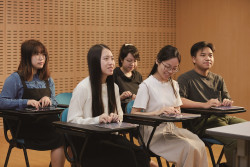Yueju Accomp is an innovative new app, developed by the Research Centre for Transmission of Cantonese Opera (RCTCO) at EdUHK, which transforms a tablet into an erhu or a pipa. Using Expression Grid musical notation, the app allows users to play different Cantonese opera songs in the unequal heptatonic tunes found in the genre. It was granted a patent by the Hong Kong Intellectual Property Department last December.
Built-in music score
The Yueju Accomp app comes with ten musical scores notated in the traditional Chinese gongche method, including Cantonese opera classics such as ‘Song of a Barbaric Land’ from Romance of the Phoenix Chamber and ‘Fragrant Sacrifice’ from The Flower Princess. It also includes scores based on the Education Bureau’s suggested materials such as The Three Little Pigs and Mulan Joins the Army.
Playing is straightforward, as users only need to tap on the keys representing different notes. By doing so, they can perform different pieces of music with 12 types of melodic instruments such as the erhu, pipa, guzheng, and violin, as well as 14 types of percussion instruments including cymbals and temple blocks. There are five Sins (keys and scales) to allow users to play specific songs.
To help users better appreciate the unique characteristics of Cantonese opera, all tracks in the app have been performed live by professional musicians in a recording studio, giving a high-quality sound. To make the performance sound more layered, traditional techniques such as tremolo and acciaccatura can also be created by using different finger gestures when playing on the tablet.
Electronic Chinese orchestra

Music students enjoying using the Yueji Accomp app
Professor Leung Bo-wah, Director of the RCTCO, says a key purpose for developing the app is education, so that it can be used as a resource for music teachers to teach accompaniment of Cantonese opera in class. He explains that at present, each primary and secondary school decides how Cantonese opera is taught, and a typical classroom may not be equipped with all the key instruments needed. With this app, they would simply need iPads to form an ensemble of 10 to 12 musicians. Dr Leung Chi-hin, Assistant Professor in the Department of Cultural and Creative Arts, hopes that in the future the concept of an electronic Chinese orchestra could be promoted, so that students can take part in creating and performing Cantonese opera pieces.
The app is also a useful tool for amateur opera singers to rehearse and practise. A singer and an accompanist himself, Professor Leung says amateurs often learn a musical instrument in order to practise their intonation. With Yueju Accomp, they can use an iPad to replace different musical instruments; a functionality which has been very well received within the industry. He adds that Cantonese opera is an intangible cultural heritage, and both the performances and theories, as well as the moral values behind the art form, are of great educational value to the wider community. He hopes that the new app will further promote Cantonese opera culture and attract new audiences.





